It is not often these days that a college romance fructifies into a wedlock. Corporate Citizen unlocks the story of love that has culminated into marriage, for we believe in the stability of a relationship and family unit. We bring to you real-life romances that got sealed in marriage
Entrepreneurial couple Amruta and Mandar Deogaonkar believe marriage as a partnership works best when spouses complement each other’s strengths and weaknesses, and work towards common goals. In their case, the goals happen to be the growth of Jaisons Group, the family owned integrated real estate players engaged in three different verticals—construction solutions, smart living and work space solutions and a unique holiday village home concept called Synergy. And even as the company charts its own along with parenting their two boys-Karan (12) and Aseem (8)
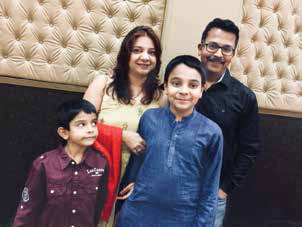
Mornings are the Deogaonkars’ favourite time of the day. Even as they drop off their boys to school, it’s time to unwind a bit, chat about the latest happenings, and possibly enjoy breakfast together at their favourite Udupi joint, before starting the work day at 9 am. And though it’s a packed schedule to be sure, both are happy to put in the effort it takes to make the most of their day together.
This story was scripted in the late nineties on the campus of Pune’s famous COEP (College of Engineering), even as both Amruta and Mandar were pursuing their civil engineering. Typically, as it happens, it was the classic case of opposites attracting each other. “I am outgoing, extroverted and social, whereas he was the more studious, reserved and academic type. While we knew each other from the very start of our engineering days, it was only in the last year that we became friendly,” shares Amruta. “We were both organising a college fashion show together, and that gave us the chance to get to know each other.”
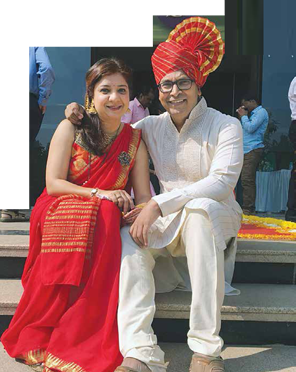
On his part, Mandar was drawn to her confidence and energy. “These are excellent qualities in anyone. Most certainly so in a potential partner,” he says.
Nevertheless, they both took their time saying ‘I do’. Both had fledgling careers to think of.
Post his graduation, Mandar headed to the US for his MS, while Amruta went onto do her MBA in North Maharashtra University, in her native place Jalgaon. “Those days my grandmother happened to be very ill and I needed to be with her in her last days. After she passed away and I completed my MBA, I gave my GRE and TOEFL and went abroad to pursue my second Masters.” The duo were finally wed in 2000, and went back to the US to pursue their education and careers, before finally returning to Pune and the family business in 2002.
From the outset, both Amruta and Mandar have been ambitious and focused about taking the family owned Jaison Group from being a contracting firm to a manufacturing unit. Gradually, they went on to establish their holiday village Synergy as well. To do that, both had to share responsibilities, and leverage each other’s strengths to optimum advantage.
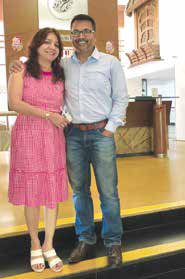
“There are certain aspects that are her strong points and there are some that are mine. The idea is to give space and support to your spouse in the direction that they are best suited. This really works out well in the long run,” says Mandar.
Meanwhile, Amruta had no qualms about taking that mandatory career break to be with her boys. “It is all about priorities. I felt no sense of loss in spending more time with my children initially, before finally resuming full time work,” she says.
While the initial years were spent with their in laws, she is clear about pointing out that there was no sense of burden there. “Adjustment is a good thing. It builds lives and families,” she shares.
Nevertheless, responsibilities are carefully shared in both the personal and professional zones. “This way both progress,” says Amruta.
Like every couple, both have also worked out a way to resolve conflict. “We always refer to the most recent issue. If the other person stepped down last time, it’s your turn this time,” she smiles. “The important thing to realise is that one can’t win every battle. It is often essential to let go in the interests of the bigger picture. Knowing when to keep quiet is the key.” While Mandar adds, “One way of resolving fights is to recognise where your spouse is strong and where they need support.”
There are certain aspects that are her strong points and some that are mine. The idea is to give space and support to your spouse in the direction that they are best suited
—Mandar
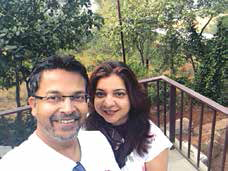
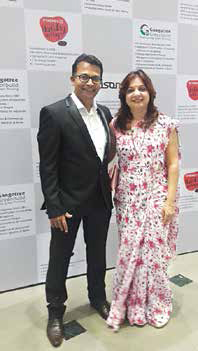
Naturally, parenting their two boys Karan (12) and Aseem (8) is an important zone of teamwork. Here too, both are on the same page, about providing the children the right atmosphere and environment to develop their respective skills.
“Frankly, both my children study just before their exams,” laughs Amruta. “Studies are important, but so are extracurricular activities for overall development of the child’s personality.”
Early on, both children exhibited vastly different interests and abilities. “While Karan is musically inclined, Aseem loves sports. So both of us decided that Mandar, being the musically gifted parent, would take charge of Karan, and I, of Aseem,” she says. “This way we are both able to give them focused attention.”
And while spending time with children is important, Mandar is of the opinion that the perfect balance is often not possible. “Frankly speaking, there are moments when business takes over. But I look at it this way—the focus and excellence one demonstrates towards one’s chosen fields is also an important take away for the children,” he says.
At the end of the day, both would say shared goals and priorities are the pillars on which a relationship stands. “It is a good thing that our respective personalities complement each other. While business is about taking risks, it does help to have one partner serve as the reality check and grounding factor, especially when it comes to taking big decisions,” rounds off Amruta.
By Kalyani Sardesai